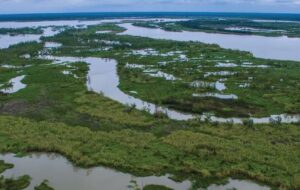
States that Sought to Curb EPA Authority Over Wetlands are the Least Likely to Protect Wetlands, New Report Finds
Washington, D.C. – With the one-year anniversary of the U.S. Supreme Court wetlands decision Sackett v. EPA on May 25, a new report reveals that the states that joined West Virginia’s brief supporting the limits on federal authority ultimately approved by the Supreme Court are the least likely to protect wetlands that are now exempt from the Clean Water Act.
This is despite claiming in their brief that states have not hesitated to “flex their authority” to protect these critical natural resources, according to the report by the Environmental Integrity Project (EIP).
“Justice Alito, writing for the 5-4 Sackett majority, assured us that ‘states can and will continue to exercise their primary authority to combat water pollution by regulating land and water use.’ That may have been wishful thinking,” EIP Executive Director Eric Schaeffer wrote in the report. “Based on a review of current state laws, at least 18 states do not require permits before developers dredge or fill wetlands that are now exempt from federal regulation under Sackett, regardless of their ‘physical, biological or chemical’ impact on nearby open water, while six more states lack such requirements in tidal or non-coastal areas.”
Seventeen of these 24 states joined an amicus brief asking the Supreme Court to limit the EPA’s authority to protect wetlands.
These limitations arise from state laws that prohibit adoption of any regulations stricter than federal rules or which limit state jurisdiction to coastal waterways, or because states have never established a wetlands permitting program for other reasons
For a list of the states, click here for the full report.
The EIP report notes that a March 2024 U.S. Fish and Wildlife Service report to Congress found that wetland loss in the U.S. between 2009 and 2019 increased by 50 percent over the previous decade. An area of wetlands larger than Rhode Island (about 670,000 acres) was lost to real estate development, farming, sea-level rise and other causes from 2009 to 2019.
After this period of severe wetlands loss, the Supreme Court’s decision on May 25, 2023 in the Sackett vs. EPA case further stripped away federal protections for many wetlands. Left exposed by the decision are wetlands that lack a “continuous surface connection” with a waterway, but which remove pollutants that would otherwise reach nearby rivers, lakes and streams through periodic floods or through groundwater discharges.
“While wetland losses during the ten-year period surveyed by the U.S. Fish and Wildlife Service obviously predate the 2023 Sackett decision, the disturbing trend is likely to get worse if the states, including those that hailed the Supreme Court’s decision, do not step up to protect wetlands no longer subject to federal law,” wrote Schaeffer, former director of civil enforcement at EPA. “Will they rise to the challenge?”
For a copy of the report, click here.
The Environmental Integrity Project is a nonprofit organization dedicated to protecting public health and our natural resources by holding polluters and government agencies accountable under the law, advocating for tough but fair environmental standards, and empowering communities fighting for clean air and clean water.
Media contact: Tom Pelton, Environmental Integrity Project (443) 510-2574 or tpelton@environmentalintegrity.org


